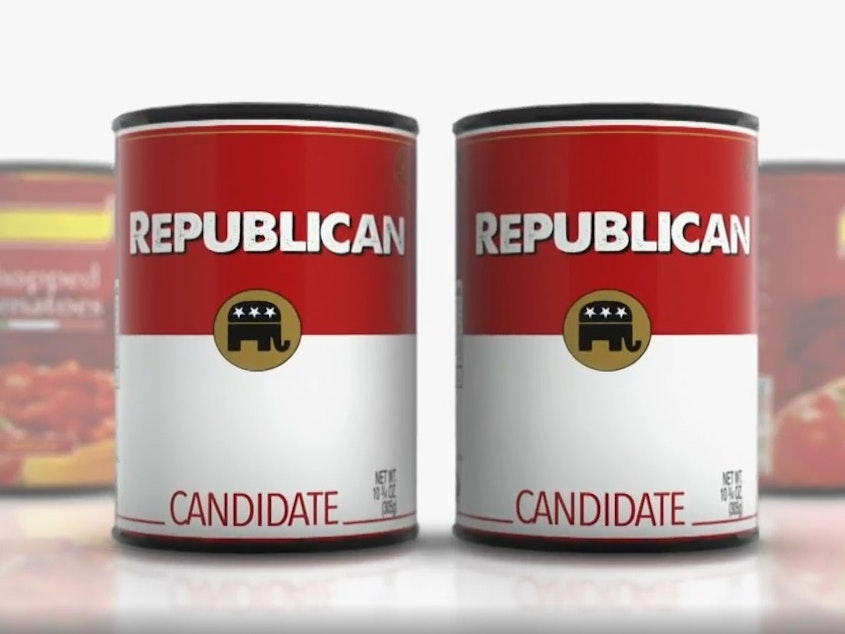Democrats are bankrolling ads promoting fringe Republican candidates. Here's why

As the midterm primary season rolls along, voters may have noticed a strange phenomenon of political advertising: Democrats paying for ads supporting Republican candidates.
In multiple states – including Colorado and Illinois, which hold primaries on Tuesday – Democrats have been attempting to boost far-right Republicans, under the assumption that they would be easier to beat in a general election.
It's a political gamble, but it has worked in the past.
"This has to be done very carefully," said Claire McCaskill, a former Democratic Senator from Missouri.
In 2012, McCaskill's reelection campaign spent $1.7 million on an advertising blitz during the GOP primary to highlight the conservative credentials of candidate Todd Akin. It was more money than Akin's campaign had spent throughout the entire primary.
Sponsored
"There were three viable candidates and Todd Akin was kind of the weirdest one," McCaskill said. "I knew he might say some weird things if he were nominated. And he had less money, so we took a poll and figured out what Republican voters would really like about him."
McCaskill put her name on the ads, as is required for political advertising, but casual viewers may not have realized they were paid for by a Democrat.
For most of the primary season, Akin had been behind in the polls. But he surged in the last two weeks of the campaign as McCaskill's ads aired across Missouri. He ended up winning the primary, then losing handily to McCaskill in the general election.
Fast forward a decade, and some Democrats are hoping to replicate that strategy by boosting GOP candidates who espouse far-right ideologies or tout the lie that Donald Trump won the 2020 presidential election.
In Pennsylvania, Democratic gubernatorial nominee Josh Shapiro spent hundreds of thousands of dollars on TV ads attacking GOP primary candidate Doug Mastriano. While the ads were negative, they deliberately gave a large platform to issues that resonate with many conservative voters, including skepticism about the legitimacy of the 2020 election – a kind of reverse psychology that Mastriano himself welcomed.
Sponsored
"I'm going to have to send him a thank you card," Mastriano later told a local news outlet after seeing the ads. Mastriano, who is being investigated by the House January 6th Committee, went on to win the Republican nomination for governor in May.
In California, a political action committee affiliated with Democratic House Speaker Nancy Pelosi paid for ads explicitly promoting conservative GOP candidate Chris Mathys over his more moderate competitor in the state's 22nd Congressional District. Mathys ended up losing.
Tuesday's primaries in Colorado and Illinois will test the strategy again.
In recent weeks, a progressive super PAC in Colorado began running ads highlighting the conservatism of state representative Ron Hanks, who has questioned the legitimacy of the 2020 election. His more moderate opponent, Joe O'Dea, released a statement accusing "far-left dark money groups" of "propping up" Hanks before the election.
"If Democrats spend $1 million to help Hanks win the GOP primary, that will save them $20 million in the general. It's actually brilliant," GOP strategist Greg Brophy told Politico.
Sponsored
A similar dynamic is playing out in Illinois, which also holds its primary on Tuesday. The Democratic Governors Association has spent millions of dollars running ads saying that Darren Bailey, a state senator and GOP candidate for governor, is "too conservative for Illinois." Bailey has called the ads "beautiful" and recently told interviewers at Crain's: "Oh yeah, I dig them."
But meddling in Republican primaries could be risky for Democrats. Polls show that a clear majority of Republicans believe Joe Biden was illegitimately elected in 2020, so pro-Trump candidates may do better than expected in a general election.
"You also have to be careful what you wish for," McCaskill said. "I would urge caution, and usually there is a lot of analysis that goes into this because nobody wants to waste money in a campaign." [Copyright 2022 NPR]



